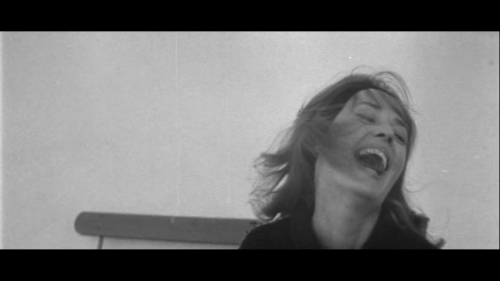La donna che rompe il concatenamento nel desiderio di cui parla Deleuze, perchè non è una molteplicità, un evento collettivo. Non si tratta, come dice D. di desiderare un insieme o essere un insieme di cose concatenate.
E’ il camminare con una risata, una tristezza, un sorriso, un gesto sul margine tra ciò che si comprende e ciò che si desidera. Non entrambi, l’uno o l’altro. E se si salta giù dal margine si perde tutto.
E’ il fermo immagine del volto di Catherine che sospende l’inutile chiacchericcio di Jules e Jim.
Ed oggi? Ci viene in mente la Helen del Professore di desiderio di Roth, che pure è del 77.
Il racconto continuo ha cambiato narratore. Dai due amanti del cantico al racconto maschile sulla donna (ma almeno Flaubert poteva credibilmente dire d’essere M.Bovary) alla descrizione dell’effetto sugli uomini di una donna che progressivamente scompare. Di Linda non sappiamo granchè, solo che Pablo, il protagonista, parte da Torino e va a Roma perchè deluso nei suoi sogni di discesa dal margine verso una vita normale. Ma i suoi stessi sogni, a dire il vero, erano una finzione.
Nel Professore, infine, la storia maschile di un uomo che per certi versi cerca di vivere al margine prende Helen e la successiva moglie, una donna perbene, come le due impossibilità ai lati del crinale.
Certamente ne abbiamo persa di letteratura, magari sbagliamo, ma ci sembra una discendenza interrotta. Perchè? Si che ne abbiamo conosciute di donne così. Ci sono. E forse lo siamo.
Perchè il Mercato ci nasconde?
The woman who breaks the chain in the desire of which speaks Deleuze, because there is a multiplicity, a collective event. It is not, as he says D. desiring a set or a set of things to be concatenated. And ‘ the walk with a laugh, a sadness, a smile, a gesture on the margin between what we understand and what you want. Not both, one or the other. And if you jump off the edge you lose everything.Lady Brett Ashley Fiesta of Hemingway. The Linda ‘s Companion Pavese. And in a perfect way, and finally visually better, the Catherine of Truffaut’s Jules and Jim (1962).
And still the image of the face of Catherine that suspending the useless chatter of Jules and Jim . And today ? We come up Helen of “Professor of desire”, the famous book written byPhilip Roth , as far back as ’77 .
But his own dreams, to be honest, were a sham. In Professor, finally, the story of a masculine man who in some ways trying to live on the edge takes Helen and subsequent wife, a decent woman, like the two sides of the ridge impossibility. Certainly we have lots of literature, maybe wrong, but it seems a descent interrupted. Why? Is that we have known women like that. There are. And maybe we are.



